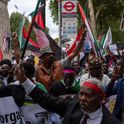Oscar Pistorius, accused of murdering his girlfriend: "Violence and brutality is in the news every day in South Africa."
Last month, nine South African policemen catapulted our country yet again into the international headlines by dragging taxi driver Mido Macia down the street from behind their van. He was later found dead in his cell. But now I am reading of another horror, that did not make the international headlines. It was not captured on someone’s mobile phone.
Two men died after they were set alight by a mob in the Freedom Park informal settlement near Rustenburg. This is the town now famous for the massacre of 34 mineworkers by police at Lonmin’s Marikana mine on 16th August last year.
“One of the two men was already burnt beyond recognition whilst his counterpart was still in flames with a wooden table placed on top of his dead body [when police arrived],” a police spokesman said.
The story takes me back to the 1980s, when suspected police informers were “necklaced”: tyres doused with petrol put around their bodies and burnt alive. It is easy for one’s mind to leap back to the violence of those times. Dirk Coetzee, the man who started the apartheid government’s police hit squads in 1980 to kill liberation activists, has just died aged 67. He personally murdered seven activists.
Violence and brutality is in the news everyday in South Africa. We are a nation that is in mourning, asking ourselves why this happens. Why are we like this? In the weeks before and after Reeva Steenkamp, the girlfriend of Oscar Pistorius (above) was found dead at his house, reports of other cases, such as gruesome gang rapes, had the country in shock. Then there was the case of the nine policemen videoed dragging the taxi driver down the street. Once again, unbidden, the question has come to haunt us: are we an inherently violent and brutal nation?
Graca Machel, Nelson Mandela’s wife and a revered international activist, said at the memorial of the taxi driver that “South Africa is an angry nation.” “We are on the precipice of something very dangerous with the potential of not being able to stop the fall,” she said. “The level of anger and aggression [in this country] is rising. This is an expression of deeper trouble from the past that has not been addressed.”
Machel’s assertion reflects a country at sea. Many of us are looking back at the past and particularly at apartheid violence, and trying to sift some meaning from that. Others, such as President Jacob Zuma, refuse to acknowledge the truth.
“South Africa is not a violent country—it is certain people in our country who are violent. By and large, we are not—we are peace-loving people,” Zuma told traditional leaders in the week of the burial of the taxi driver. We are keenly aware that we are not the miracle “rainbow nation of God,” as Archbishop Desmond Tutu memorably put it. Our violence is splashed on the front pages of the world, and it hurts.
Like Zuma, some of us are in denial about our problem. Others wallow in self-pity and ask why we are like this. It cannot be poverty, because by developing world standards we are a prosperous nation. It surely cannot be apartheid’s fault alone (Zuma said “the apartheid system could only be sustained through violence, and violence became entrenched”). So what is it?
Some, such as Oscar Pistorius’s father Henke, blame South Africa’s violent crime rates on the African National Congress.
“It speaks to the ANC government, look at white crime levels, why protection is so poor in this country, it’s an aspect of our society,” he told the Daily Telegraph. The Pistorius family owns 55 guns. Pistorius senior, as many have pointed out, fails to recognise that the overwhelming majority of crime victims in South Africa are black. Such analysis of violence, crime and its brutal nature is plentiful in South Africa. Helpful answers are few.
For many other South Africans, though, the recent attention on South Africa’s violence is a call to arms. Non-governmental organisations such as the excellent Sonke Gender Justice Network have been the heroes of the battle to eradicate gender-based violence. In a country where at least 65,000 sexual offences were reported last year, and convictions hover around only 4,000, many of these NGOs have been toiling alone to assist victims and push government to act. They continue the good fight.
Yet, as illustrated by the numerous vigilante murders that occur across the country and violence of other kinds, we are still a nation that merely talks and fails to act. Depressed as we are by all these things, and much as we analyse and talk on radio shows and in newspaper columns, South Africa is still caught in the headlights. Not much that is concrete is happening to make us a less violent and brutal country. And we weep, and are shamed, and every day is another horror.












